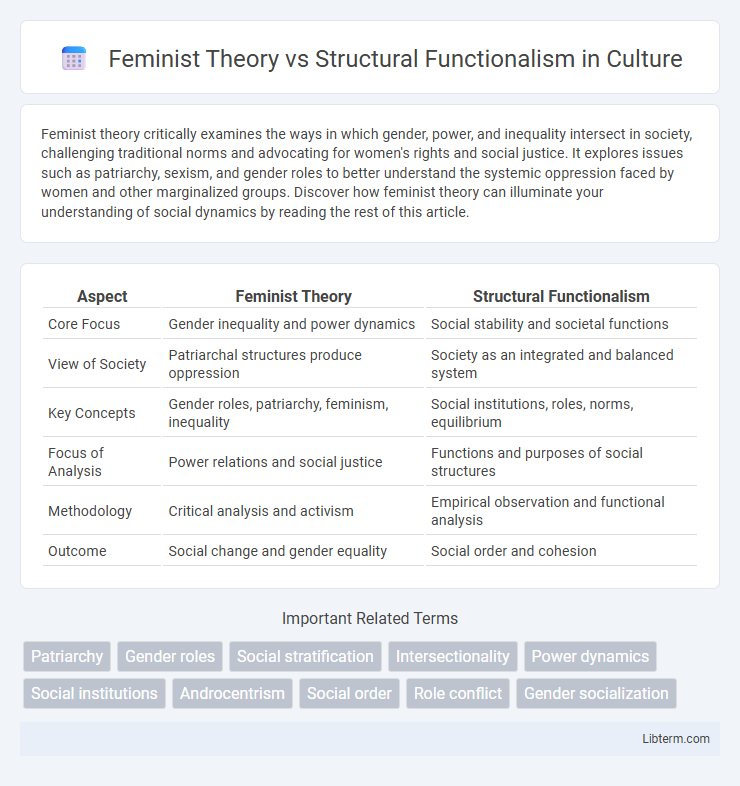Feminist theory critically examines the ways in which gender, power, and inequality intersect in society, challenging traditional norms and advocating for women's rights and social justice. It explores issues such as patriarchy, sexism, and gender roles to better understand the systemic oppression faced by women and other marginalized groups. Discover how feminist theory can illuminate your understanding of social dynamics by reading the rest of this article.
Table of Comparison
| Aspect | Feminist Theory | Structural Functionalism |
|---|---|---|
| Core Focus | Gender inequality and power dynamics | Social stability and societal functions |
| View of Society | Patriarchal structures produce oppression | Society as an integrated and balanced system |
| Key Concepts | Gender roles, patriarchy, feminism, inequality | Social institutions, roles, norms, equilibrium |
| Focus of Analysis | Power relations and social justice | Functions and purposes of social structures |
| Methodology | Critical analysis and activism | Empirical observation and functional analysis |
| Outcome | Social change and gender equality | Social order and cohesion |
Introduction to Feminist Theory and Structural Functionalism
Feminist Theory critically examines power structures and gender inequalities embedded in society, emphasizing the role of patriarchy in shaping social relations and advocating for gender justice. Structural Functionalism analyzes society as a complex system whose parts work together to promote stability and social order, focusing on institutions and their functions in maintaining societal equilibrium. Both frameworks offer distinct lenses: Feminist Theory challenges existing hierarchies to reveal oppression, while Structural Functionalism explains societal cohesion through interrelated social structures.
Historical Background and Evolution
Feminist Theory emerged in the late 19th and early 20th centuries as a response to gender inequalities, drawing from social movements advocating women's rights and suffrage. Structural Functionalism, developed by sociologists like Talcott Parsons in the mid-20th century, aimed to understand society as a system of interrelated parts working together to maintain stability. Over time, Feminist Theory evolved to challenge traditional power structures and address intersectionality, while Structural Functionalism faced critiques for overlooking social inequalities and dynamic social change.
Core Principles of Feminist Theory
Feminist Theory centers on gender inequality, emphasizing power dynamics and social structures that perpetuate patriarchy and oppression of women and marginalized genders. It critiques traditional social roles and institutions, advocating for social change toward equality and justice. Core principles include analyzing intersectionality, challenging systemic sexism, and promoting empowerment through social activism and policy reform.
Core Principles of Structural Functionalism
Structural functionalism centers on the idea that society is a complex system composed of interrelated parts working together to maintain stability and social order. Core principles include the functions each social institution performs to contribute to the collective equilibrium, emphasizing consensus, social integration, and the importance of norms and values. Unlike feminist theory, which critiques power imbalances and gender inequalities, structural functionalism prioritizes systemic cohesion and the roles necessary for societal continuity.
Approaches to Gender and Power
Feminist Theory critically examines gender as a social construct embedded in power relations, highlighting systemic inequalities and advocating for gender equity and social change. Structural Functionalism views gender roles as integral components of social order and stability, emphasizing functional differentiation between male and female roles within institutions. Feminist Theory challenges the functionalist perspective by exposing how traditional gender roles reinforce patriarchal dominance and limit individual freedoms.
Perspectives on Social Institutions
Feminist theory critiques social institutions as structures that perpetuate gender inequalities and maintain patriarchal power dynamics, emphasizing the role of power relations and intersectionality in shaping experiences. Structural functionalism views social institutions as essential components that contribute to societal stability and cohesion by fulfilling necessary functions such as socialization, regulation, and integration. While feminist theory challenges the status quo and calls for transformative change, structural functionalism tends to justify existing social arrangements by highlighting their functional importance.
Analysis of Social Change and Stability
Feminist Theory analyzes social change by emphasizing the disruption of gender inequalities and challenging patriarchal power structures that maintain social hierarchies. Structural Functionalism views social stability as the result of interdependent social institutions working together to maintain equilibrium and cohesion in society. While Feminist Theory advocates for transformative change to achieve gender justice, Structural Functionalism prioritizes maintaining order and continuity through the reinforcement of social norms and roles.
Critiques and Limitations of Each Theory
Feminist Theory faces critiques for sometimes prioritizing gender issues at the expense of other intersecting identities, leading to accusations of essentialism and lack of attention to class or race complexities. Structural Functionalism is often criticized for its emphasis on social stability and consensus, which can obscure social inequalities and power dynamics, especially those related to gender and oppression. Both theories have limitations in addressing the full spectrum of social realities, with Feminist Theory challenged by internal diversity and Structural Functionalism by its conservative bias toward maintaining social order.
Comparative Case Studies and Examples
Feminist theory challenges the gender biases inherent in structural functionalism by highlighting power inequalities and advocating for social change, as seen in comparative case studies of workplace dynamics where feminist analysis reveals systemic gender discrimination overlooked by structural functionalist perspectives. Structural functionalism emphasizes social stability and roles, illustrated in examples such as family studies where gender roles are seen as functional necessities, contrasting with feminist critiques that expose these roles as mechanisms of patriarchy. Comparative studies in education demonstrate how feminist theory addresses gendered barriers to equal opportunity, whereas structural functionalism tends to justify existing social structures as beneficial for societal order.
Implications for Contemporary Sociology
Feminist Theory challenges traditional social structures by highlighting gender inequalities and advocating for social justice, significantly influencing contemporary sociology's emphasis on power dynamics and social change. Structural Functionalism, focusing on social stability and cohesion, tends to overlook systemic inequalities, which feminists argue perpetuate marginalization and hinder social progress. Contemporary sociology integrates insights from both perspectives to critically analyze social institutions, aiming to balance understanding of social order with the need for equity and inclusion.
Feminist Theory Infographic

 libterm.com
libterm.com